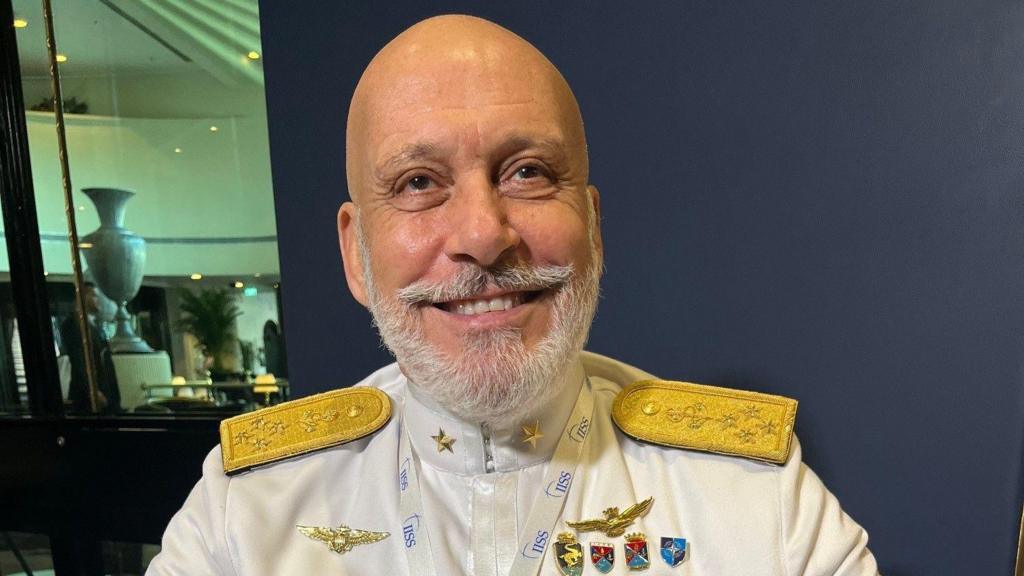“`html
NATO “will stand with Ukraine until the day we have them sitting around the table for a long-lasting peace,” a senior official from the military alliance has stated to the BBC.
Admiral Giuseppe Cavo Dragone, who assumed the role of chair of NATO’s military committee in January, added that from an operational perspective, the Russia-Ukraine war has reached a stalemate, and “it was almost time to sit and talk because it’s a waste of lives.”
Highlighting the fact that Russia’s full-scale invasion of Ukraine in 2022 led to the inclusion of Finland and Sweden into the Western alliance, Adm Dragone characterized the war as a strategic miscalculation for Russian President Vladimir Putin, despite recent incremental advances by Russia on the battlefield.
“They will not get a friendly or puppet government like in Belarus. Putin will not succeed.”
When questioned about the preparedness of European nations to sustain their support for Ukraine’s defense, he affirmed their commitment. He expressed his belief that they have experienced a “wake-up call” and are now assuming greater responsibility for their own defense.
In June, NATO members agreed to increase their defense spending to 5% of GDP by 2035. This decision followed repeated calls from US President Donald Trump for member states to meet this target.
Regarding Russia’s recent announcement concerning long-range, nuclear-powered weapons, such as the Burevestnik and the Poseidon, the former Italian chief of defense staff and naval aviator downplayed NATO’s concerns, emphasizing that it is a defensive nuclear alliance.
“We are not threatened by them,” he stated, “we are just ready to defend our 32 nations and our one billion people. We are a nuclear alliance.”
Addressing the potential risk of future invasions or attacks, Adm Dragone suggested that if such an event were to occur – emphasizing the conditional nature of the statement – the Baltic states (Estonia, Latvia, and Lithuania) would be the most likely targets.
However, he emphasized that as NATO members, Article 5 would be invoked, which considers an attack on one member to be an attack on all, and NATO would respond in their defense.
When asked if this included the US, he affirmed: “Yes, because they have committed to this, and they have underlined that they are still in the business.”
Among NATO’s current defense priorities, Adm Dragone identified air defense as the most critical. Recent incursions by Russian drones into Polish and Romanian airspace have prompted the alliance to enhance its air defense capabilities.
Concerning the potential activation of a “drone wall” along NATO’s eastern borders, he stated that this would be implemented within months and that “the alliance’s Allied Command Transformation in Norfolk [Virginia] is already working on that.”
“There is a lot of stuff on the market which will fulfil our immediate needs so we set up a new activity which is Eastern Sentry… integrating all the air defence that we already have on our eastern flank.
“Airspace incursions are pretty frequent, we escort them out and that’s basically the game,” the admiral stated.
Despite the absence of any indication that Russia is altering its course in the war in Ukraine, and despite growing dissent among some members – notably Slovakia and Hungary – regarding support for Ukraine’s defense, Adm Dragone concluded on an optimistic note.
“The alliance is reliable, it is mature, there is a cohesion which is our centre of gravity.”
“The alliance is stronger than our adversaries, and we will stay with Ukraine up to the day that peace will break out,” he added.
Those taking the drug, which contains a substance banned in many other countries, are experiencing severe side effects.
Oleksandr Syrskyi says special forces have been deployed but denies Russian reports Ukrainian troops are surrounded in Pokrovsk.
Three Bulgarians are jailed for painting red hands on France’s Holocaust Memorial in a suspected case of Russian “destabilisation”.
This week alone, the Russian president unveiled two nuclear-capable weapons – but their value may be more symbolic than military.
Diana Loginova sang songs critical of the Kremlin. The 18-year-old and her bandmate are now in court.
“`

